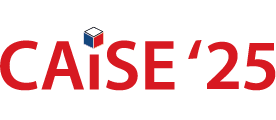
Open Debate @ CAiSE'25
CAiSE'25, Vienna, Austria June 16-20, 2025Information Systems Engineering Research at a Crossroads: Enslavement by rankings, or true pursuit of knowledge?
Science represents one of the major achievements of human civilization. Scientific knowledge has enabled humanity to solve and understand a wide range of serious problems. At the same time, in present day society, science seems to have (d)evolved into a ranking-driven social system. The latter may have a perceived advantage of providing an objective way to measure the quality of scientists and their institutions.
At the same time, it has given rise to goals and patterns of action that are not always in harmony with the actual mission of science; the pursuit of knowledge.
Rankings of institutes and scientists seem to increasingly become an end in themselves, resulting in a "enslavement by ranking", over-specialization resulting in "scientific silos", and even an alienation of scientists from their actual mission.
For Information Systems Engineering as a field of science, which takes much of its inspiration from practice, this raises potentially serious existential questions. As such, this is clearly a topic that concerns all of us, and it is certainly associated with controversial points of view. As such, a good starting point for a debate with a large number of participants from our community.
Words like “enslavement” and “true pursuit” are provocative by design. Nevertheless, our community seems to be at a crossroads, where provocative statements can aid in raising a direly needed debate.
This Open Debate session is part of the
Invitation to Debate initiative, and will not be organised as a traditional panel session, but rather as a highly interactive session involving the audience and five of the authors, Steve Alter, and Avi Shaked, Pascal Ravesteijn, Ulrich Frank, and Hajo Reijers, of earlier made
position statements, and will be chaired by Henderik Proper.
The session will start with a short summary, by the chair, of the debate so-far. This summary will cover the position statements, and the discussion on social media. After this summary, the audience can ask for further clarifications from the authors that are "on stage", after which the debate will continue with the audience. As such, an active participation of the audience is expected to create a truly open debate.
The current position statements for this topic are available
here.


